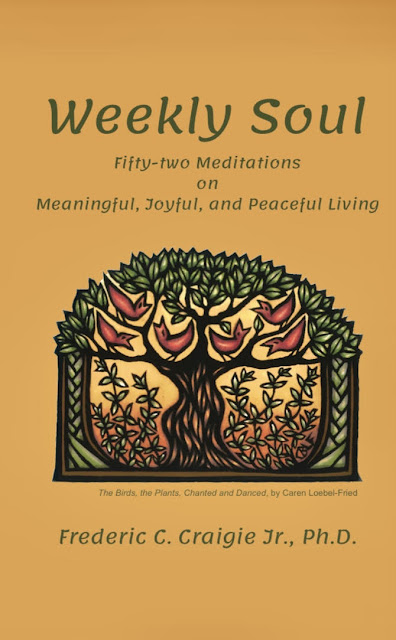Weekly Soul. Week 6 - The Experience of Aliveness
Today's meditation from Weekly Soul: Fifty-two Meditations on Meaningful, Joyful, and Peaceful Living by Dr. Frederic Craigie.
-6-
Although the
spiritual dimension is always present, people are not aware of it. If we think
of this in terms of images, we can say we have a vintage wine cellar, but we
rarely drink from it. We have an interior castle, and we seldom visit it. There
is a treasure buried in our field, and we do not know how to unearth it… The
distinction between the presence of the spiritual and the awareness of the
spiritual is foundational in spiritual teaching and sets in motion the
spiritual project. We are asleep, and we need to awake; we are blind, and we
need to see; we are deaf, and we need to hear; we are lost, and we need to be
found; we are dead and we need to come back to life. All these images point to
the spiritual venture of becoming aware of what is there.
Jack Shea
You are alive as you are aware of what is
there.
The experience of aliveness is rooted in
the life of the spirit. When you partake of the vintage wine cellar, when you
visit the interior castle, when you unearth the buried treasure… when you
experience the richness that is always there… you are alive.
C.
Everett Koop, M.D., was a pioneering pediatric surgeon and Surgeon General
during the Reagan administration. He is best noted for his campaign against
smoking and for his insistence that the government not turn a blind eye on the
incipient HIV/AIDS crisis. He was also a deeply spiritual man. Our appointments
together in the same Department of Family and Community Medicine at Dartmouth
Medical School privileged me to invite him to be the keynote presenter in 1994
at an annual symposium on spirituality and health that I had founded in 1987. Memorably,
his definition of “spirituality” was “the vital center of a person; that which
is held sacred.”
Our modern words, vital and vitality
come from the Latin vitalis, which means pertaining to “life or” “life force.” The spiritual life—the experience
of vitality—has to do with being aware of the sacredness that is there, waiting
to be explored and expressed.
Aliveness, as Thurman points out, follows
behavior. Do what makes you come alive. But aliveness also follows from
attitudes and perspectives and awareness.
Think of some of the most ordinary and
banal moments in your daily life: carting groceries from the store back to the
car, brushing your teeth, paying the light bill, and taking out the trash. Is
there not something sacred undergirding these moments?
You are alive. You breathe. You move. You
are capable of experiencing emotions. You can form words and express ideas. You
can love and be loved. You can suffer, and you can find and chart paths to
resilience and growth. You can live your own, completely unique, irreplaceable
life.
You can’t, of course, reflect on these
things to the exclusion of doing what you need to do. You have to drive home,
unpack the groceries, and make dinner. But might you pause, sometimes, to
partake of the flow of aliveness and vitality by opening your heart to what is
there?
And don’t linger too long in the wine
cellar.
Reflection
- Pause, sometime, in a
particularly ordinary moment in your daily life. Use all of your senses to
experience this moment.
- Reflect on the sacredness that
undergirds this moment. What is there that you cherish about your life
that is part of the flow of this moment?
- Open yourself to the energy of
being truly alive, even in this ordinary moment. What difference might
this make for you as you carry this forward?
Author
John
(Jack) Shea, STD,
is a theologian, master storyteller, and poet whose long-time passion has been
supporting the spiritual formation and life of individuals and groups. Among a
number of positions along the way, he previously served as Professor of
Systematic Theology and Director of the Doctor of Ministry Program at the
University of St. Mary of the Lake. The author of over two dozen books, he
lectures and consults widely to faith-based organizations about theological
reflection and formation, and values-based corporate life. You can read more
about his work at www.jackshea.org.
I met Jack when he graciously invited me in 1999 to take part in a colloquium, sponsored by the Park Ridge Center for the Study of Health, Faith, and Ethics, exploring practical approaches to incorporating spirituality in health care. The quotation comes from Spirituality and health care: Reaching toward a holistic future (The Park Ridge Center, 2000), which grew out of the proceedings of that colloquium.
For more posts by and about Fred and his book, click HERE.
To purchase copies of this book at 25% discount,
use code FF25 at MSI Press webstore.
Want to buy this book and not have to pay for it?
Ask your local library to purchase and shelve it.
VISIT OUR WEBSITE TO LEARN MORE ABOUT ALL OUR AUTHORS AND TITLES.
 |
Follow MSI Press on Twitter, Face Book, and Instagram.
Interested in publishing with MSI Press LLC?
Check out information on how to submit a proposal.
Planning on self-publishing and don't know where to start? Our author au pair services will mentor you through the process.
Want an author-signed copy of this book? Purchase the book at 25% discount (use coupon code FF25) and concurrently send a written request to orders@msipress.com.
Julia Aziz, signing her book, Lessons of Labor, at an event at Book People in Austin, Texas.
Want to communicate with one of our authors? You can! Find their contact information on our Authors' Pages.
Check out our rankings -- and more -- HERE.














Comments
Post a Comment